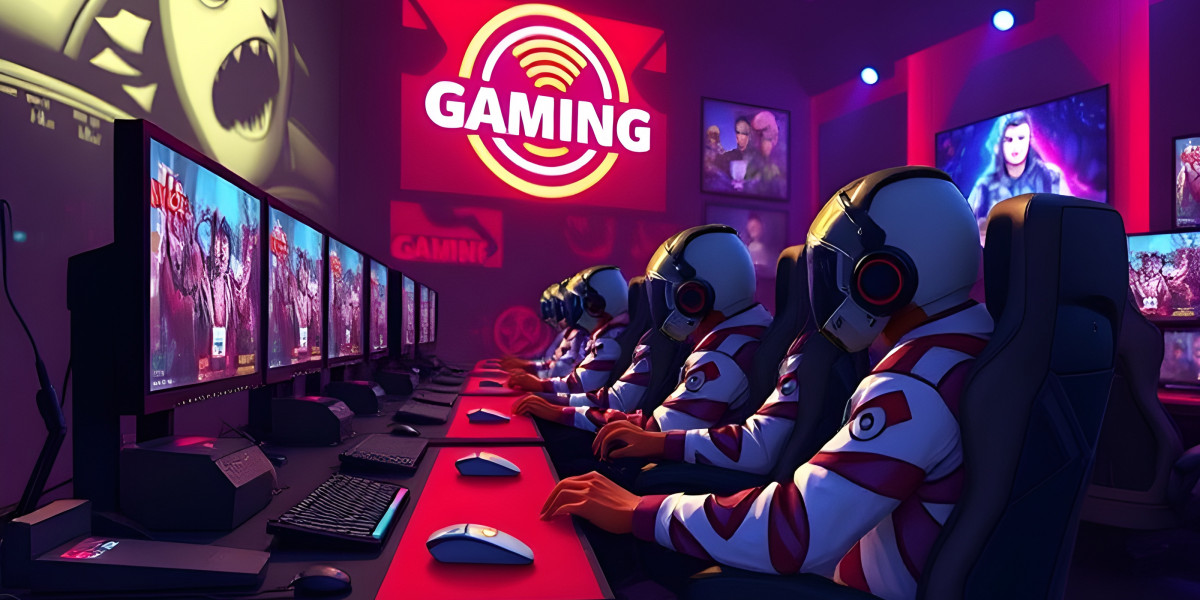The Evolution of Online Gaming: A Digital Odyssey
Introduction
Online gaming has transformed the way we play, connect, and experience entertainment in the 21st century. Once a niche pastime limited to a few enthusiasts, it has exploded into a global phenomenon, captivating millions of players worldwide.
The Early Days of Gaming
1. The Birth of Video Games
The journey of gaming began in the 1950s and 1960s when pioneers like William Higinbotham and Ralph Baer developed simple electronic games. Higinbotham’s “Tennis for Two” and Baer’s “Brown Box” laid the groundwork for the video game industry. However, it wasn’t until the 1970s that home consoles, like the Atari 2600, made gaming accessible to the masses.
2. The Rise of Arcade Games
The 1980s marked the golden age of arcade gaming, with titles like “Pac-Man,” “Donkey Kong,” and “Space Invaders” dominating the scene. These games encouraged social interaction, as players gathered in arcades to compete for high scores. The arcade culture laid the foundation for online gaming, highlighting the importance of multiplayer experiences.
The Emergence of Online Gaming
1. Dial-Up Connections and Early Multiplayer Games
The 1990s saw the dawn of online gaming, fueled by the proliferation of dial-up internet connections. Games like “Meridian 59” and “Ultima Online” introduced players to massive multiplayer online role-playing games (MMORPGs), allowing them to interact in virtual worlds. These early titles set the stage for future developments in online gaming.
2. The Impact of Broadband Internet
The transition from dial-up to broadband internet in the early 2000s revolutionized online gaming. Faster connections allowed for smoother gameplay and enhanced graphics. The launch of games like “World of Warcraft” in 2004 marked a turning point, attracting millions of players and establishing a dedicated community. The MMORPG genre exploded, with players immersing themselves in rich narratives and vast landscapes.
The Evolution of Genres
1. First-Person Shooters (FPS)
First-person shooters emerged as a dominant genre in online gaming, with titles like “Counter-Strike,” “Call of Duty,” and “Halo” revolutionizing competitive gaming. These games emphasized teamwork, strategy, and skill, leading to the rise of esports—a form of competitive gaming with organized tournaments, professional players, and substantial prizes.
2. Battle Royale and Survival Games
The late 2010s witnessed the meteoric rise of battle royale games, with titles like “Fortnite,” “PlayerUnknown’s Battlegrounds (PUBG),” and “Apex Legends” capturing the imagination of players. These games combine elements of shooting, survival, and strategic gameplay, often featuring large maps where players compete until only one remains.
The success of battle royale games has reshaped game design and player expectations, emphasizing accessibility and social interaction. Players can collaborate with friends or engage with strangers, fostering a sense of community within the gaming experience.
The Social Impact of Online Gaming
1. Building Communities
Online gaming has become a powerful medium for building communities and connecting individuals worldwide. Players form friendships, join clans or guilds, and engage in collaborative gameplay. Platforms like Discord and Twitch have further enhanced social interactions, allowing gamers to communicate, share experiences, and stream their gameplay to a global audience.
2. The Rise of Streaming and Content Creation
The rise of platforms like Twitch and YouTube Gaming has given birth to a new generation of content creators. Streamers and YouTubers create engaging content, ranging from gameplay commentary to tutorials and live streams. This has not only transformed how games are marketed but also provided players with a sense of belonging and entertainment beyond traditional gaming.
3. The Role of Online Gaming in Socialization
For many, online gaming serves as a social outlet, especially during times of isolation, such as the COVID-19 pandemic. Games like “Animal Crossing: New Horizons” became cultural phenomena, allowing players to connect socially while engaging in relaxing gameplay. The virtual spaces created by games provided solace and community during challenging times.
Psychological Effects of Online Gaming
1. Cognitive Benefits
Online gaming can offer cognitive benefits, such as improved problem-solving skills, strategic thinking, and hand-eye coordination. Studies have shown that action games can enhance players’ ability to track multiple objects and make quick decisions. Additionally, puzzle and strategy games can improve critical thinking and planning abilities.
2. The Dark Side of Gaming
Despite the benefits, online gaming is not without its drawbacks. Issues such as addiction, cyberbullying, and toxic behavior can negatively impact players. The immersive nature of online gaming can lead to excessive playtime, resulting in diminished real-life interactions and responsibilities.
Researchers have raised concerns about the potential for gaming addiction, particularly among younger players. The World Health Organization has recognized gaming disorder as a mental health condition, emphasizing the importance of balance and moderation.
The Cultural Significance of Online Gaming
1. Representation and Diversity
Online gaming has the potential to promote representation and diversity, allowing players to engage with various cultures and identities. Games like “Overwatch,” featuring a cast of diverse characters, reflect the changing landscape of gaming and the growing demand for inclusivity.
Moreover, indie games have emerged as platforms for underrepresented voices, tackling social issues and exploring unique narratives. Titles like “Celeste” and “Hellblade: Senua’s Sacrifice” address mental health, identity, and personal struggles, resonating with players on a deeper level.
2. Gaming as Art
Online games are increasingly recognized as a legitimate art form, with rich storytelling, stunning visuals, and innovative gameplay. Game developers are pushing the boundaries of creativity, crafting experiences that evoke emotions and provoke thought. The success of narrative-driven games like “The Last of Us” and “Life is Strange” illustrates the artistic potential of the medium.
The Future of Online Gaming
1. Virtual Reality and Augmented Reality
The future of online gaming is poised to be shaped by advancements in virtual reality (VR) and augmented reality (AR). VR technology offers immersive experiences, transporting players into fully realized digital worlds. Games like “Beat Saber” and “Half-Life: Alyx” showcase the potential of VR in creating engaging gameplay.
AR games, such as “Pokémon GO,” have demonstrated the power of blending the digital and physical worlds. As technology continues to advance, the lines between reality and gameplay will blur, offering players new and exciting ways to interact with their environment.
2. The Rise of Cloud Gaming
Cloud gaming is revolutionizing the accessibility of online gaming. Services like Google Stadia, NVIDIA GeForce NOW, and Xbox Cloud Gaming allow players to stream games without the need for high-end hardware. This democratizes gaming, enabling individuals to experience AAA titles on various devices, including smartphones and low-spec computers.
Cloud gaming has the potential to reshape the industry, offering a subscription-based model that aligns with the growing trend of digital consumption. As internet infrastructure improves globally, cloud gaming can expand its reach, further connecting players across different regions.
3. The Evolution of Esports
Esports has rapidly gained recognition as a legitimate competitive platform, drawing millions in viewership and sponsorship. Major tournaments, such as The International (Dota 2) and the League of Legends World Championship, showcase the skill and dedication of professional players, elevating gaming to a spectator sport.
The future of esports is bright, with universities establishing esports programs and professional leagues emerging. As the industry grows, it creates opportunities for players, coaches, analysts, and production teams, fostering a vibrant ecosystem around competitive gaming.
Conclusion
Online gaming has come a long way from its humble beginnings to become a multifaceted industry that influences culture, technology, and social interactions. As it continues to evolve, online gaming will undoubtedly face challenges and opportunities that shape its future. By fostering inclusivity, promoting healthy gaming habits, and embracing technological advancements, the gaming community can create a positive and enriching environment for players of all backgrounds.
As we venture into the future, one thing is certain: online gaming will continue to captivate and connect people across the globe, offering a unique and immersive experience that transcends traditional entertainment. The digital odyssey of online gaming has just begun, and its potential is limited only by the boundaries of our imagination.








